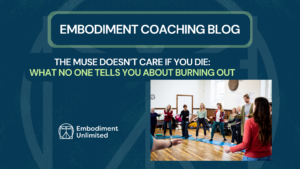Dive deeper into embodiment coaching as we explore the importance of versatile coaching styles, skills-based learning, and navigating the emotional complexities that arise in this transformative practice.
Review of Part One
In Part One of this series on embodiment coaching, we examined the foundational principles that render this practice distinctive.
Embodiment coaching incorporates physical, emotional, mental, and spiritual dimensions, promoting deep and meaningful transformation. We underscored the global expansion and evolution of this approach, acknowledging both its successes and challenges, including the issue of “mimetic spread”—the proliferation of concepts that lack actionable value.
Finally, we emphasised the significance of self-awareness and presence, demonstrating how a coach’s state profoundly influences the coaching dynamic. This sets the stage for further exploration into the nuances and transformative potential of embodiment coaching.
Building a Range of Coaching Styles
In addition to self-awareness, cultivating a variety of coaching styles is key. While some coaches may prefer a more dynamic and challenging approach, adaptability is crucial. A flexible repertoire of techniques, including gentler methods, allows for deeper connections with clients.
Techniques for shifting states can be effective but demand practice and conscious effort. Over time, coaches can develop the versatility needed to respond to different client needs.
The Importance of Skills-Based Learning
Embodiment coaching benefits from a skills-based learning approach, breaking essential competencies into manageable components. By focusing on building specific skills over time, coaches can develop a strong foundation for their practice.
A structured learning process, identifying core embodied intelligence skills, ensures that coaches gain practical abilities without feeling overwhelmed.
Overcoming Behavioural Change Challenges
Facilitating behavioural change remains one of the most significant hurdles in coaching. Effective strategies involve layering new practices gradually and encouraging integration into daily life. Emphasising manageable, realistic steps helps both coaches and clients make lasting changes.
Peer support and accountability further aid this process, providing a shared space for reflection and sustained commitment to growth.
Confrontation and Emotional Challenges
Working with the body can elicit emotional challenges and confrontations. While it is essential for coaches to support their clients through these moments, they must also be prepared to engage with their own emotions. This willingness to confront discomfort can lead to profound breakthroughs.
Recognising the influence of one’s environment, relationships, and connection to the natural world is also vital in the embodiment journey.
Part Two Summary
In this second exploration of embodiment coaching, we examined the significance of cultivating a versatile array of coaching styles and the adaptability necessary to meet the diverse needs of clients. We emphasised the advantages of a skills-based learning approach, highlighting the gradual and structured development of essential competencies. We also addressed the complexities involved in facilitating enduring behavioural change, underscoring the importance of small, realistic steps and the role of peer support. Lastly, we investigated the emotional depth associated with working with the body, acknowledging the importance of coaches engaging with their own emotions and the impact of environmental and relational factors. This deeper examination prepares us for further insights into the transformative potential of embodiment coaching.
Become a certified embodiment coach
Learn the principles, tools and techniques you need to coach safely and effectively with the body. You’ll explore ways to work with your clients to bring about real, lasting change and support them in their growth.
For more information about the Certificate of Embodiment Coaching – visit our CEC page



